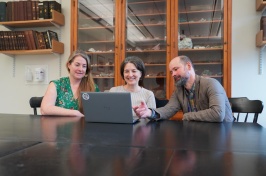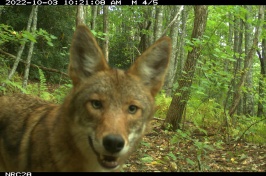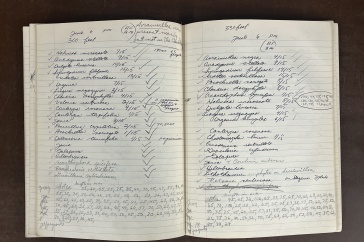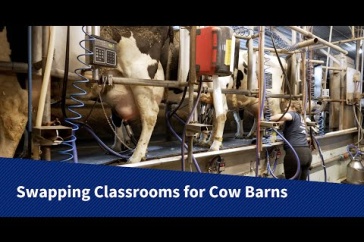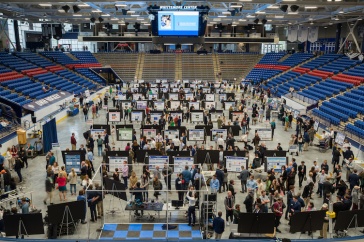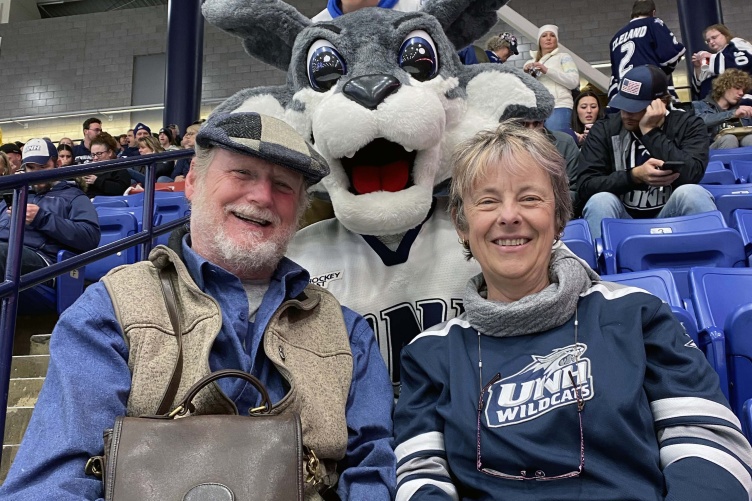
Bonnie Brown and her husband enjoy a game at the UNH Whittemore Center
When Bonnie Brown, professor and chair of the department of biological sciences, was 24 years old and in graduate school, she drove a van from Virginia to Panamá with her then-boyfriend. Not because she wanted to necessarily, but because she worried about him making the trip alone. He was, she recalls, a terrible driver.
After an illness, sandstorms in Mexico, and a Pan American Highway that in places in Central America seemed to disappear into impenetrable rainforest, necessitating the use of machetes to find their way, Brown and her boyfriend decided to turn back. They spent a few comparatively easy days in Veracruz, Mexico before putting his van on a boat and flying the rest of the way to Panamá.
Tenaciousness combined with a realistic assessment of circumstances did not just get Brown safely to Panamá forty years ago. It has shaped her life and career.

COLSA: What's your current position? How long have you been in the position? And can you give me a brief overview of what it is you do in your work?
Bonnie Brown: Professor and chair of the department of biological sciences. I’ve been at UNH about six years. What takes most of my time is the administrative work. For example, I nominate faculty and students [for awards]. I prepare summaries about what the department is doing and how it's doing. I review faculty. I review staff. I go to meetings. Most of every day I feel like I'm just pounding out emails and letters.
COLSA: What motivates you to do what you do? What attracts you to your area of work?
Bonnie: I like to make things, to draw, to build, to paint, to fix. I feel like that's what I'm doing here: making or putting together or in some cases fixing stuff that could be better. I like to take things apart and put them back together. I also like to garden, so that means I like to watch things grow or help them grow. I guess that's what motivates me to do this.
COLSA: What about your research? Is there a motivating factor there?
Bonnie: It's kind of the same, because my research is facilitating aquaculture. The tool I've been using is metagenomics, which looks at genetic markers in the field. You take a sample of water, or a fish, or some dirt, and you look for the genetic traces of the things that have been there and maybe what they're doing. It’s like putting together a puzzle or it's like taking that puzzle that you've put together and helping figure out some process.
COLSA: What do you like most about your job?
Bonnie: The thing I like most is seeing the department we've built and how it's developed and how the faculty support each other.
On the teaching side, I have always liked it when students come up after lecture and say, ‘That was really cool,’ or ‘I didn't know that.’ Or when I'm teaching lab and I hear a student say, ‘Hey, come look at this’ and everybody runs over and looks in the microscope. Seeing students learn something that they didn’t know and getting all lit up about it makes my day.
COLSA: What are the goals you most want to accomplish in your work? Not so much the goals that are in your job description, but goals that you hold personally.
Bonnie: There have been two from the day I came to UNH. One, I knew this department needed to develop and that there were people that wanted to retire and needed to know that it was okay to leave and that the department would still be a thriving, cool place to be.
Two, creating a culture where faculty are collegial and helpful to each other and are comfortable and willing to support each other and facilitate each other's success.
COLSA: When did you first know you wanted to pursue a career in research and or teaching?
Bonnie: Since elementary school I've been teaching and doing research. When I was a kid, my mom was an amateur scientist. She had a jar on the window called a hay infusion, which is literally a clear glass jar, and you throw some hay in there, stick it on the windowsill, and watch what grows.
She had an ancient microscope, and she would pull it out and put a drop on a slide and look at it. She wrote and drew little pictures of what she saw in a notebook. She would let me look as she did that. I also remember that when I was in elementary school, my favorite vocabulary word was hypothesis, an educated guess. What a cool word.
COLSA: Where did you go to college and grad school?
Bonnie: College was University of Alabama in Birmingham. I got a BS in biology. I volunteered in a research lab at the UAB med school. I also volunteered in the operating room. I gloved up and everything, and they would let me stand on a stool and look over the surgeon's shoulder while they were working.
Grad school was Old Dominion University in Norfolk, Virginia, where I studied oceanography. I didn't want to do straight up oceanography research. I wanted to do something molecular and if possible, something that had to do with aquaculture. But I still wanted to be an oceanographer because I had seen the movie Jaws, and I wanted to be like Richard Dreyfuss.

COLSA: What led you to this job and what attracted you to UNH?
Bonnie: I was at Virginia Commonwealth University, since the late 80s, early 90s. I was the first full female professor in the biology department.
The current chair left to work in the dean's office, so I became acting chair, then interim chair. I felt like I needed to stay there and help promote the other female faculty, so I applied to go from interim to real chair.
But in that process, I found this job. When I came here, I was already doing oyster research, and the first thing I saw when I drove into Durham was Oyster River. I thought that might be a sign. Then the people here were great. They smiled and offered to drive me around Durham and all the way to the UNH Coastal Marine Lab. So, I came here, and I've loved it ever since.
COLSA: Where did you grow up and what was it like?
Bonnie: I was born and raised in Birmingham, Alabama. We lived in a place called Shades Mountain.
I got good grades in elementary school. In high school, nobody wanted to do well. At night or after school, I'd be with all the other kids smoking and drinking, but then as soon as I got home, I'd study so that I could make good grades. But couldn’t advertise that I made good grades because then I’d be unpopular. It was kind of schizophrenic, and I didn't like it. So, I tested into another school called Resource Learning Center that had maybe 150 students. I was lucky I got to go to that high school where achievement was valued, and I graduated in three years. I had the best friends there, some of whom I still know.
COLSA: Tell me about your mother and your father.
Bonnie: My dad was a mechanical engineer. During the day, he was at work. At night, he would come home and tinker. He would buy motorcycles that didn't work and fix them or invent and make things like pneumatic shocks for motorcycles. He didn't talk much.
My mom was an artist. She always had art projects. She did sculptures and put things together and painted. She was a scientist, too. She liked to tinker with living stuff, and she always liked to have animals around, so she was always bringing home a cat or a dog or hamsters or guinea pigs. She did not have a very easy life while I was growing up. Her job was to have babies and raise them. That was hard for her.
COLSA: Do you have any key mentors or people who deeply influenced who you are, what you believe in and what you're committed to in your work and life?
Bonnie: When I was an undergrad, one of the many jobs I had was as a cell culture technician. I worked for Marianne Egan, who studied immunology and juvenile rheumatoid arthritis. She taught me how to make polyacrylamide gels and how to do cell culture. All the while, she had her hair dyed blonde and walked around in high heeled shoes. So, she could be a woman and a scientist, right? I really liked that. She was a good mentor and somebody that I looked up to and wanted to emulate. And, of course, Richard Dreyfuss.
COLSA: Did you have any life-changing experiences that put you on the path that led you to what you're doing today?
Bonnie: I am pretty sure that when I decided I should be an environmental scientist, which is essentially what I am, I was six years old. My dad was hanging out drinking beer with his buddies, and I heard him say, “There's enough coal until my grandchildren are here.”
The first thing I thought was, well his grandchildren are my children. And then I thought, what is coal? And what are my grandkids going to do when coal runs out? It flipped a switch. I suppose that was the switch that set me in motion for the rest of my life, whether I knew it or not at the time. Ever since then, I've thought about resources. We don't think deeply enough about how we affect our environment when we make choices.
COLSA: What do you do in your spare time? Hobbies, outside interests?
Bonnie: Most days, as soon as I get home, I cook. I’ll pull out whatever is in the refrigerator and make something that tastes good.
I also like to goof off in the barn. I've got a little tool room where I can make things, saw things, drill things. I also have a garden where I like to challenge myself and figure out what things can you grow in New England now that the climate is changing.
COLSA: You talk about opening up your refrigerator and making something from whatever you find there. What are five things you always have in your refrigerator or your pantry?
Bonnie: Mayonnaise. Baked garlic. I always have baked garlic. I grow garlic and bake it, and then you store it in the fridge, and it lasts forever. But it doesn't matter that it lasts forever because I cook with it every day. So mayonnaise, baked garlic, limes because I like margaritas, salad dressing. It really doesn't matter what kind. My son makes his own salad dressing, but I'm happy to just buy it. And probably turkey bacon.
COLSA: What's your favorite book and your favorite movie?
Bonnie: My favorite book has been, as long as I can remember, Stephen King's The Stand. My favorite movie is Tremors.

COLSA: If you could be or do anything else, what would that be?
Bonnie: Well, I'd have to be independently wealthy, but I would want to be an artist. I would want to make sculptures and paint and make the frames that go around the paintings. A full service artist.
COLSA: If you could have dinner with five famous people living or dead, whom would you invite?
Bonnie: Stephen Jay Gould, Stephen King, Mother Teresa, Marie Curie and Cleopatra. That'd make a nice dinner party!
COLSA: What one word would you use to describe yourself?
Bonnie: Determined. I have the ability to stick it out and keep trying.
COLSA: What word would your friends use to describe you?
Bonnie: My friends in Richmond used to say that I am like the Nike slogan, “Just do it.” They would say, “Bonnie will do it.” It's not one word, but when they needed something, they knew they could call me, and I would help no matter what.
COLSA: What are you most proud of?
Bonnie: Well, most people say their kids, and I would agree. I’m also proud that I went into teaching, because I feel like every person you've taught has the ability to take what they’ve learned and pass the knowledge to more people. If you could think of all the careers you could have, teaching has got to be the one career where you can have an exponential effect.
COLSA: What's one thing that few people know about you?
<Bonnie: Probably that I'm a frustrated artist. You know, I don't really get to do it much. I wish I could just cover my office with art, but there's just no time.
COLSA: What has been the happiest day of your life?
Bonnie: It's got to be two days. Seeing my daughter finally after almost two full days in labor was such an awesomely happy feeling. I said I would never, ever do it again. And I didn't. So when my husband Rusty said we should have another, we adopted Bryan. When they handed baby Bryan to me in Phnom Penh, after 33 hours of flying and riding in taxis, it was the exact same feeling of joy and relief. That's just about the happiest it gets.






























